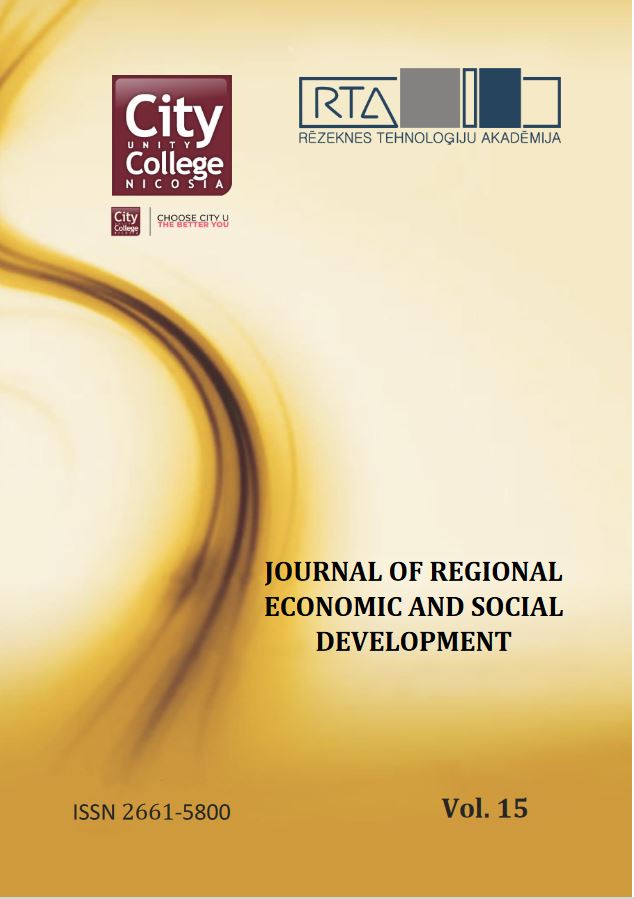METODOLOGICAL ASPECTS OF THE FORMATION OF AN ENTREPRENEURIAL ECOSYSTEM
DOI:
https://doi.org/10.17770/jresd2023vol15.7381Keywords:
entrepreneurial ecosystem, concept, formation, structure, principles, new enterprises, strategic orientation, methodological toolsAbstract
Purpose and aim of the study: The purpose of the study is to determine the theoretical and conceptual foundations of the process of forming an entrepreneurial ecosystem. The task of the study is to summarize the theoretical and methodological support of the studied issues and to substantiate the methodological approach to the formation of an entrepreneurial ecosystem.
Design /Methodology / Approach: The study used general scientific and special methods: scientific abstraction, analysis and synthesis, induction and deduction, systemic and comparative analysis, structural and logical, an ascent from the abstract to the concrete, and the method of parametric estimates. The literature was selected using the databases Google Scholar, MDPI, Science Direct and Scopus.
Main Findings: The analysis of the theoretical and methodological aspects of the entrepreneurial ecosystem and the formation of its structure shows that there is no systematic approach to determining the links and nature of interaction (including inter-level interaction) between different participants of the entrepreneurial ecosystem. It has been established that the structure of entrepreneurial ecosystems is unique and is able to provide systemic support for entrepreneurial activity by providing access to markets, finance, human and intellectual capital.
Originality: The study reveals the process of formation of the entrepreneurial ecosystem in the aspect of developing a strategy for the entry of new enterprises into it.
Implications: The results of the study make it possible to synthesize the ideas of territorial models of innovation and entrepreneurship, to carry out strategic positioning of the enterprise in the entrepreneurial ecosystem in order to provide attractive value propositions for consumers in the long term.
Downloads
References
Acs, Z., Autio, E., & Szerb, L. (2014). National systems of entrepreneurship: measurement issues and policy implications. Research Policy, 43(3), 476- 494.
Audretsch, D., Cunningham, J. A., Kuratko, D. F., Lehmann, E., & Menter, M. (2019). Entrepreneurial ecosystems: economic, technological, and societal impacts. The Journal of Technology Transfer, 44 (2), 313-325. https://doi.org/10.1007/s10961-018-9690-4
Cohen, B. (2006). Sustainable Valley Entrepreneurial Ecosystems. Business Strategy and the Environment, 15 (1), 1-14.
Cunningham, J. A., Menter, M., & O’Kane C. (2018). Value creation in the quadruple helix: A micro level conceptual model of principal investigators as value creators. R&D Management, 48(1), 136–147. https://doi.org/10.1111/radm.12310
Daniel, L., Medlin, C.J., O’Connor, A., Statsenko, L., Vnuk, R., & Hancock, G. (2018). Deconstructing the Entrepreneurial Ecosystem Concept. In: O'Connor, A., Stam, E., Sussan, F., Audretsch, D. (eds) Entrepreneurial Ecosystems. International Studies in Entrepreneurship, Springer, 38, 23-44. https://doi.org/10.1007/978-3-319-63531-6_2
Eiriz, V., & Barbosa, N. (2022). SMEs‘ Strategic Responses to a Multinational‘s Entry Into a Cluster. Journal of Small Business Strategy, 32(4), 126-142. https://doi.org/10.53703/001c.38513
Feldman, M. A., Francis, J., & Bercovitz, J. (2005). Creating a Cluster While Building a Firm: Entrepreneurs and the Formation of Industrial Clusters. Regional Studies, 39, 129-141. https://doi.org/10.1080/0034340052000320888
Fujita, M., & Thisse, J. (2002). Economics of Agglomeration: Cities, Industrial Location and Regional Growth. Cambridge: Cambridge University Press.
Isenberg, D. (2010). The Big Idea: How to start an entrepreneurial revolution. Harvard Business Review, 88 (6), 41-50.
Isenberg, D. (2011). The entrepreneurship ecosystem strategy as a new paradigm for economic policy: principles for cultivating entrepreneurship. Babson Entrepreneurship Ecosystem Project, Babson College, Babson Park: MA.
Isenberg, D. (2014). What an entrepreneurship ecosystem actually is. Harvard Business Review blog., May, 12.
Kuratko, D. F., Fisher, G., Bloodgood, J.M., & Hornsby, J. (2017). The paradox of new venture legitimation within an entrepreneurial ecosystem. Small Business Economics, 49(1), 119-140. https://doi.org/10.1007/s1187-017-9870-x
Lundvall, B. (1992). National Systems of Innovation: Towards a Theory of Innovation and Interactive Learning. London: Pinter.
Malecki, E. J. (2018). Entrepreneurship and entrepreneurial ecosystems. Geography Compass, 12 (3), 12359. https://doi.org/10.1111/gec3.12359
Mason, C., & Brown, R. (2013). Entrepreneurial Ecosystems and Growth Oriented Entrepreneurship. Background paper prepared for the workshop organised by the OECD LEED Programme and the Dutch Ministry of Economic Affairs on, The Hague, Netherlands. https://www.oecd.org/cfe/leed/entrepreneurial-ecosystems.pdf
Porter, M. (1990). The Competitive Advantage of Nations. New York: MacMillan.
Prahalad, C. (2005). The Fortune at the Bottom of the Pyramid: Eradicating Poverty through Profits. Saddle River: Wharton School Publishing, 401.
Sahenian, A. (1994). Regional Advantage of Culture and Competition in Silicon Valley and Route 128. Cambridge, MA: HBP.
Spigel, B. (2017). The Relational Organization of Entrepreneurial Ecosystems. Entrepreneurship Theory and Practice, 41(1), 49–72. https://doi.org/10.1111/etap.12167
Spigel, B., & Harrison, J. R. (2018). Towards a Process Theory of Entrepreneurial Ecosystems. Strategic Entrepreneurship Journal, 12(1), 151-168.
Spigel, B. (2020). Entrepreneurial Ecosystems: Theory, Practice, Futures. Cheltenham, UK: Edward Elgar.
Stam, E. (2010). Entrepreneurship, evolution and geography. In: The handbook of evolutionary economic geography, 307-348.
Stam, E. (2015). Entrepreneurial Ecosystems and Regional Policy: A Sympathetic Critique. European Planning Studies, 23(9), 1759-1769. https://doi.org/10.1080/09654313.2015.1061484
Stam, E., & Spigel, B. (2018). Entrepreneurial Ecosystems. In: Blackburn, R., De Clercq, D., & Heinonen, J. (eds). The SAGE Handbook of Small Business and Entrepreneurship, SAGE, London, 407-422.
Stevencon, H.H., & Jarillo-Mossi, J.C. (1986). Preserving entrepreneurship as companies grow. Journal of Business Strategy,7(1), 10-23. https://doi.org/10.1108/eb039138
Valdez, J. (1988). The Entrepreneurial Ecosystem: Toward a Theory of New Business Formation. Proceedings of the Small Business Institute Director's Association. San Antonio: University of Texas, 28.
Van de Ven, H. (1993). The development of an infrastructure for entrepreneurship. Journal of Business Venturing, 8 (3), 211-230. https://doi.org/10.1016/0883-9026(93)90028-4
Wurth, B., Stam, E., & Spigel, B. (2022). Toward and Entrepreneurial Ecosystem Research Program. Entrepreneurship Theory and Practice, 46(3), 729-778. https://doi.org/10.1177/1042258721998948


